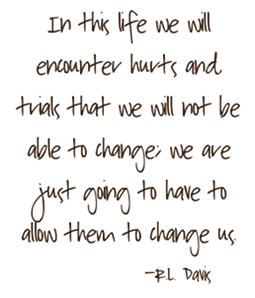I wanted to share another great article from griefcounselor.org which does a great job explaining grief from different physical and emotional aspects.
The Grief Experience
Grief is the natural, healthy, spontaneous, unlearned, normal, emotional, healing process that occurs after a significant loss. Grief is experienced uniquely by each of us, and is often experienced in waves, with emotions, thinking, physical, and social responses coming and going in terms of the intensity, duration, and order of our reactions to the loss. In addition there are many other variables that can affect our grief reaction.
Emotional Components of loss can include:
Emotional Components of loss can include:
- Shock, numbness, feeling of unreality
- Helplessness
- Vulnerability
- Fearfulness
- Sadness
- Anger, irritability
- Emptiness, loneliness
- Guilt
- Carelessness, harming oneself or others in any way
- Outbursts, euphoria
Cognitive Components of loss can include:
- Slowed and/or disorganized thinking
- Confusion, aimlessness, difficulty concentrating
- Preoccupation, rumination
- Unaffected, no thoughts at all about the person or the circumstances
- Dreams
- Decreased self-esteem
- Altered perceptions, sensing the presence of the deceased person
Physical Components of loss can include:
- Fatigue, sleep disturbance
- Decreased or increased appetite
- Physical distress, nausea
- Anxiety, hypo- or hyperactivity
- Greater susceptibility to illness
Social Components of loss can include:
- Being unaware of others' needs
- Passivity
- Withdrawing from or avoiding others
- Decreased work productivity
- Loss of interest in usual pleasures, including hobbies, relationships and/or sex
- Strained relationships, differences in grieving needs between self and others
Variables that can affect your grief reaction:
- Your own history of past losses, through deaths, divorce, relocation, lost dreams, phase of life changes. Violations of one's safety (accidents, fire, personal trauma, world crises), or health changes
- Your current personal and situational stressors
- Your personal beliefs in a faith tradition or spiritual practice
- Your cultural and family expectations about loss
- If the loss is anticipated or unanticipated
- If the loss is marked by traumatic events
- The degree to which closure with the person was possible
- A "loss out of season," for the person who has died or for you
- Your ability to share the loss with others
- Your coping style and use of stress management resources
- Working through past hurts and forgiveness issues
- Finding a way to make meaning of the loss
Grieving is a process. There is no correct timetable for the waves and reactions of grief. Yet, as you work through your grief, you can regain your balance, develop a sense of completeness, and re-engage in life in a deeper way. Your self-awareness in the process can be a personal journey and also one you may wish to share with others, through family, friendship, and work circles, or through professional
and community resources.
and community resources.















0 comments:
Post a Comment